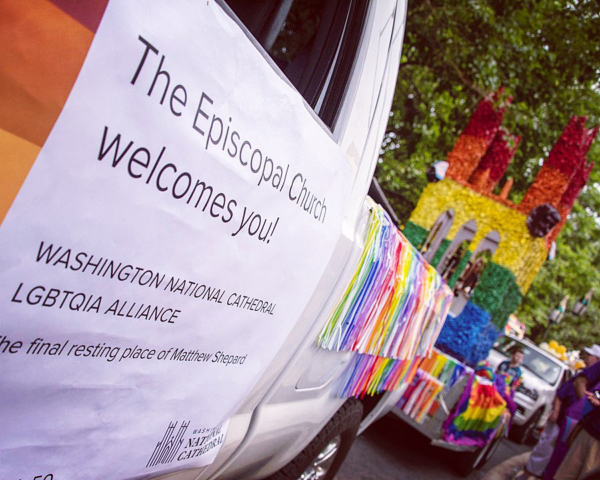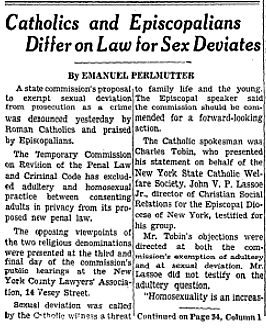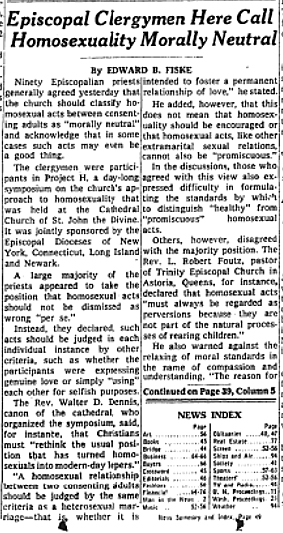
Members of Washington National Cathedral marched in the June 9 Capital Pride Parade in Washington, D.C. Photo: Danielle E. Thomas/Washington National Cathedral
[Episcopal News Service] The full inclusion of LGBTQ people in the life of The Episcopal Church had barely been considered by its policymaking bodies when the Stonewall uprising began on June 28, 1969.
But many Episcopalians, anchored in the context and rhetoric of their times, had been pushing for equality in the church as well as in society for at least seven years before the momentous event that is acknowledged as the beginning of the gay rights movement in the United States. Their progress was slow and halting.
The goal of their efforts is still not universally accepted today, a year after The Episcopal Church took its strongest step to date agreeing to a plan to give all Episcopalians, regardless of their sexual orientation, the ability to be married by their priests in their home churches.
The secular press occasionally took note of the church’s early recognition of LGBTQ people in its midst, albeit through the lens of disfunction. In late October 1962, The New York Times reported that a meeting of the House of Bishops went into executive session “to consider how to handle homosexuality and alcoholism when they occur among the clergy.” Then-Bishop of Western New York Lauristan Scaife, who chaired the Committee on Counsel for the Clergy, refused to comment to the paper.
However, Diocese of California Bishop James Pike told a news conference that “there are any number of standard weaknesses, such as homosexuality and alcoholism, that happen to people.” He said bishops need to be ready to counsel priests and offer psychiatric help when needed.

This screenshot from the Nov. 26, 1964 edition of The New York Times shows the opening paragraphs of the story, and illustrates how homosexuality was perceived.
Two years later the Diocese of New York took a different approach, supporting the New York State Temporary Commission on Revision of the Penal Law and Criminal Code’s proposal to excluded adultery and homosexual practice between consenting adults in privacy from its proposed new penal law. The Nov. 29, 1964, hearing the Nov. 29, 1964, report on the front page of The New York Times of The New York Times
John V. P. Lassoe Jr., diocesan director of Christian social relations, told the commission it should be commended for “a significant and enlightening advance” of removing penalties for consenting adult homosexual behavior from the criminal code, according to the Times.
“There is no need to restate here the ‘modern sociological and psychiatric principles’ that led the commission to suggest this change,” Lassoe said. “Obviously we accept as part of God’s continuing and progressive revelation about man’s nature, and it is clear that they have done much to reshape a view once held by religious groups.”
However, Charles Tobin, speaking on behalf of the New York State Catholic Welfare Society, said that “sexual deviation,” as the behaviors were called at the time, was a threat to family life and the young.
In 1966, Pike, recently resigned from his diocesan see amid theological controversies, told an overflow gathering at the Duke University Law School that laws controlling homosexuality, sexual practices between man and wife and abortions were unenforceable and must be changed.
Episcopalians in California soon were also supporting decriminalization moves. The California diocese then called in the spring of 1967 for the abolition of all state laws governing sexual relations in private between consenting adults. United Press International reported that the Diocesan Council “was especially concerned about the homosexuals’ ability to live free and creative lives because of legal sanctions and fear of discovery.”

This screenshot from the Nov. 28, 1967 edition of The New York Times shows the opening paragraphs of the story about the Project H gathering the day before.
The Episcopal Church’s ongoing discernment made the front page of the Times again in the fall of 1967, this time via a report about “Project H.” The Nov. 28 “day-long symposium on the church’s approach to homosexuality,” as the newspaper called it, was held at the Cathedral of St. John the Divine in New York, sponsored by Dioceses of New York, Long Island, Connecticut and Newark. The story was headlined “Episcopal Clergymen Here Call Homosexuality Morally Neutral.”
The Rev. Walter D. Dennis, a cathedral canon at the time, told the symposium that Christians “must rethink the usual position that has turn homosexuals into modern-day lepers.” Dennis, who went on in 1979 to become a bishop suffragan in New York, was the first African American to serve full time at the cathedral and was also active in the civil rights movement of the era. Dennis was also a founding member of the Union of Black Episcopalians.
More and more Christians at the time of the symposium, the Rev. Neale Secor said, were “coming to judge relationships on what they do to people involved and to society as whole.” Secor, then the rector of St. Mary’s Church in Manhattan, said that many people are open to the possibility that “homosexual relationships can be as fulfilling as heterosexual ones.”
Not everyone at the conference agreed with Dennis and Secor. The Rev. L. Robert Foutz, rector of Trinity Episcopal Church in Astoria, Queens, declared that homosexual acts “must always be regarded as perversion because they are not part of the natural processing of rearing children,” the Times reported. However, Foutz said that if homosexual tendencies were “sublimated and channeled into acts of brotherhood, social concerns and so forth,” then homosexuality could be said to have a positive side.
The Times reported that “churchmen needed more factual information on the cause of homosexuality and on such questions as whether it is possible for homosexual relationships to provide enduring ‘fulfillment’ and ‘happiness.’”
Three years after that conference and about seven miles south of the cathedral, the Stonewall Inn became the locus of protests that are being marked this month. However, when The Episcopal Church held a rare special meeting of General Convention about two months later, the event, which had been in the works for two years, did not address the events of June 28, 1969.
Then-Presiding Bishop John Hines and the Rev. John B. Coburn, then-president of the House of Deputies, had called the gathering so that bishops and deputies could discuss “concerns in our contemporary Church life which often are painfully divisive and always are areas of uncertainty and perplexity.”
‘Homosexual persons are children of God who have an equal claim upon the love, acceptance, and pastoral care of the Church’ – General Convention 1976
An agenda committee later said the major areas of discussion would be “mission, ministry and authority” and it urged that “representatives” of women, ethnic minorities and young people “be included with a seat and voice” but not vote in the gathering’s joint sessions of the two houses.
The journal documenting the next regular meeting of General Convention in 1970 contained one mention of homosexuality. It came in an essay on “law and order and justice” that was part of the report of the Joint Commission on the Church in Human Affairs. The essay noted that some police officers might be “culturally disposed to find a homosexual act much more offensive than fornication” even though both acts where then equally illegal.
It was not until 1976 that the General Convention officially put the church on record as saying (in Resolution 1976-A069) that “homosexual persons are children of God who have an equal claim upon the love, acceptance, and pastoral care of the Church” and (in Resolution 1976-A071) stating “its conviction that homosexual persons are entitled to equal protection of the laws with all other citizens.” That convention, which allowed women to be ordained as priests and deacons, also called for a study of “the Matter of the Ordination of Homosexuals.”
Since that meeting of convention until the most recent gathering in July 2018, The Episcopal Church has worked towards greater inclusion of LGBTQ people. That work has prompted some Episcopalians to leave the church in protest, in some cases setting up decades-long legal disputes.
Other Episcopalians in four dioceses have elected openly gay priests to be their bishops. The Rt. Rev. Gene Robinson served the Diocese of New Hampshire from 2004 to 2013. The Rt. Rev. Mary Glasspool served as bishop suffragan in the Diocese of Los Angles from 2010 to 2016 when she became an assistant bishop in New York. The Rev. Thomas Brown is due to be ordained and consecrated June 22 as the bishop of Maine and the Diocese of Michigan elected the Rev. Bonnie Perry earlier this month to be its 11th bishop.
This month, congregations across The Episcopal Church are marking Pride Month with celebrations and film festivals, and by marching in their communities’ pride parades.
Yet, as Presiding Bishop Michael Curry recently noted, “Pride is both a celebration and a testament to sorrow and struggle that has not yet ended.
“Especially this month, I offer special thanks to God for the strength of the LGBTQ community and for all that you share with your spouses, partners and children, with your faith communities, and indeed with our entire nation.”
– The Rev. Mary Frances Schjonberg is the Episcopal News Service’s senior editor and reporter.
The post Episcopal Church’s advocacy for LGBTQ people pre-dates Stonewall uprising appeared first on Episcopal News Service.
This post appeared here first: Episcopal Church’s advocacy for LGBTQ people pre-dates Stonewall uprising
[Episcopal News Service – General Convention 2018]
